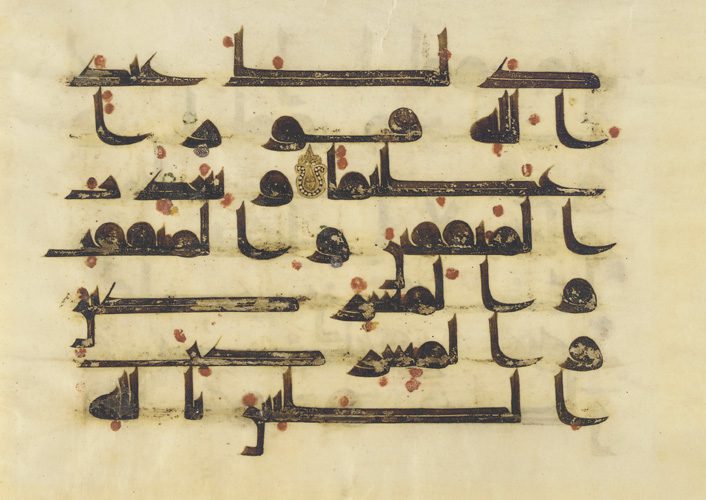
(Wikimedia Commons public domain image)
For this belief [in a physical resurrection] and others, the doubters made fun of the faithful.29 Whenever possible, they would deliberately interrupt the recitation of the Qur’an. Always they would laugh at it as just “old fairy tales.”30 Muhammad was accused of magic. Sometimes he was said to be demon-possessed or merely a crazy poet.31
It is evident from the historical record that such treatment bothered Muhammad deeply. “We know too well that what they say grieves you,” the Qur’an tells him. “Other Messengers have been denied before you. But they patiently bore with disbelief and persecution.”[1] Other Messengers had been mocked.[2] Muhammad was not to think himself unique if the unbelievers treated him without respect. “If they deny you, remember that before them the peoples of Noah, Abraham and Lot, the tribes of Thamoud and Aad, and the dwellers of Midian had denied their Messengers: Moses himself was charged with imposture.”[3] “If they reject you, know that other Messengers have been rejected before you, although they worked miracles and brought down psalms and the light-giving Scriptures.“[4]
To the unbelievers, though, Muhammad was just an ordinary man, someone who ate food like anybody else and who walked through the streets of Mecca just like anybody else.[5] This charge the Qur’an was quite willing to admit. “Muhammad is no more than a Messenger; other Messengers have passed away before him.”[6] The Prophet was commanded to say to those who questioned him, “I am but a mortal like yourselves.”[7] “The Messengers We sent before you were no more than men whom We inspired. Let them ask the People of the Book if they do not know this. The bodies We gave them could not dispense with food, nor were they immortal.”[8]
The unbelievers demanded to know why the Qur’an hadn’t been sent to one of the leading men of the region, instead of to an insignificant nobody.[9] Some insisted that Muhammad must have had a human helper, someone more competent, more learned than he.[10] And the Qur’an admits that he was unlearned, that he had never read the scriptures of earlier prophets.[11] This was in fact one of the evidences of his calling. “This Qur’an,” the book itself says, “could not have been composed by any but God.”[12] In fact, it is beyond even the reach of human imitation. “If men and jinn combined to write the like of this Qur’an, they would surely fail to compose one like it.”[13] But this did not stop some from trying. And, since it did not, Muhammad was given advice on how to deal with such presumption. “If they say: ‘It is your own invention,’ say: ‘Compose one chapter like it.'”[14] (A certain al-Nadr ibn al-Harith took up the task, but his inability to imitate the Qur’an left him utterly abashed.)
This challenge is reminiscent of the one issued by the Lord in our own dispensation, at Hiram, Ohio:
And now I, the Lord, give unto you a testimony of the truth of these commandments which are lying before you. Your eyes have been upon my servant Joseph Smith, Jun., and his language you have known, and his imperfections you have known; and you have sought in your hearts knowledge that you might express beyond his language; this you also know. Now, seek ye out of the Book of Commandments, even the least that is among them, and appoint him that is the most wise among you; or, if there be any among you that shall make one like unto it, then ye are justified in saying that ye do not know that they are true; but if ye cannot make one like unto it, ye are under condemnation if ye do not bear record that they are true.[15]
William E. McLellin, a new convert to the Church who was rather proud of his education, took up the challenge but failed miserably. The parallel is striking. Even non-Latter-day Saint orientalists have noticed it, and some have gone so far as to label al-Nadr ibn al-Harith “the McLellin of Islam.”
The unbelievers were always seeking signs as evidence of Muhammad’s prophetic calling, but he steadfastly refused to perform such miracles.[16] Indeed, he never claimed that he could. The Qur’an was his only miracle, he said. And, in fact, the individual verses of the Qur’an are called “signs” [ayaat] in Arabic, just as in the gospel of John the miracles of Jesus are called “signs.”[17] Even if some spectacular sign were given to the unbelievers, the Qur’an pointed out, it would not convert them; they would simply find some excuse to explain it away.[18] In a comment that could as well be applied to the Book of Mormon and the golden plates, the Qur’an quotes God as observing, “If we sent down to you a Book inscribed on real parchment and the unbelievers touched it with their own hands, they would still say: ‘This is nothing but plain magic.'”[19]
Footnotes 29-31 [and perhaps others] missing, somehow.
[1]6:33-34; compare 35:4, 25. God, as the Qur’an quotes him, often speaks in the royal “we.”
[2] 13:32; compare 6:10; 15:11
[3] 22:42-44.
[4] .3:184.
[5] 21:3; 23:33-34; 25:7.
[6] 3:144.
[7] 18:110.
[8] 21:7-8.
[9] 43:31.
[10] 16:103. Compare the charge made by anti-Mormons, especially in the nineteenth century, that someone else—usually Parley P. Pratt, Sidney Rigdon, Solomon Spalding, or some combination of the three—was the actual author of the Book of Mormon. Joseph Smith, they reasoned, was incapable of having written so complex a volume. And as for the obvious alternative, that it was inspired by God, well, that possibility was simply not acceptable.
[11] 29:48. It is probably in this sense that we are to understand references to Muhammad as “the unlettered Prophet” (7:157, 158). Muslims today almost universally argue that the Prophet was wholly illiterate. However, in view of his career as a successful caravan merchant, I find this unlikely. Writing was well known among the Meccan merchant class, and Muhammad probably knew at least enough to keep commercial accounts. This would still not detract from the remarkable literary quality of the Qur’an, though. Even in my opinion, it cannot be attributed to scholarship or literary experience on Muhammad’s part.
[12] 10:37.
[13] 17:88.
[14] 10:38; compare 6:93; 11:13; 28:49; 52:33-34.
[15] Doctrine and Covenants 67:4-8.
[16] See 17:90-93, for instance.
[17] The honorific title Ayatollah, used among Iranian Shiite Muslims, means “sign [aya] of God [Allah].”
[18] 15:14-15. This is quite true to life. Think of the response of the unbelieving Nephites and Lamanites in Helaman 16:15-16.
[19] 6:7.











